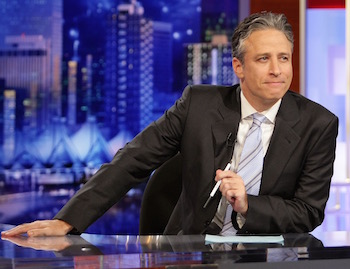Jon Stewart: Worthy Heir to Cronkite?

The smarter way to stay on top of broadcasting and cable industry. Sign up below
You are now subscribed
Your newsletter sign-up was successful
Putting Daily Show host Jon Stewart and Evening News anchor Walter Cronkite in the same sentence may sound like heresy to news purists.
Oh, never mind, I just Googled them and comedian Lewis Black already called Stewart the Walter Cronkite of his generation. So, the heresy ground is already broken.
If the purists were kicking up a fuss, I didn't hear them.
Cronkite was ideally suited to his times, an avuncular newsman who we turned to for reassurance as well as information.
Stewart was equally suited to his, a touchstone for cynical viewers generally suspicious of authority and more likely to take their news medicine with a spoonful of satire.
Stewart has been a trend-setter in knocking politicians off their pedestals and dismounting them from their high-horses, though he had plenty of help from those politicians as he chronicled their descent from highly respected figures to late-night joke machines polling even lower than journalists.
It is fitting that Thursday, his last night, is the same as the clowncar full of Republican candidates taking the stage for a debate headlined by Donald Trump.
The smarter way to stay on top of broadcasting and cable industry. Sign up below
Of course, Stewart and his skewering ways might not have gained cult status without all those foils inside the Beltway to write his material and fuel the masterful quick-cut compilations of clips he used to cut them down to size.
Sure, Stewart picks and chooses among stories — for comic effect, partly — but a Pew study back in 2007, after tracking the show for an entire year, concluded that the show "draws on the news events of the day but picks selectively among them—heavily emphasizing national politics and ignoring other news events entirely." That, said Pew, closely resembles the agenda of any number of cable news or talk radio offerings.
Stewart will be missed not only for his wicked take on issues and takedowns of politicians but also for his wicked commentary on how the media covered them. Pew found that The Daily Show spent twice as much time on stores about the media than the mainstream media did in covering the media (got that).
Stewart has repeatedly said his show is not news, but that would be news to those who learned about events, his take on them notwithstanding, by tuning in for the satire and commentary and coming away with information in the bargain.
"The Daily Show performs a function that is close to journalistic in nature — getting people to think critically about the public square," Pew said. "In that sense, it is a variation of the tradition of Russell Baker, Art Hoppe, Art Buchwald, H.L. Mencken and other satirists who once graced the pages of American newspapers."
Jon Stewart became part of the zeitgeist by not taking himself too seriously while at the same time taking issues very seriously. Like Lewis Black, his angry man was palatable and even instructive because it was also a hilarious man.
